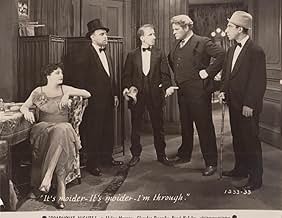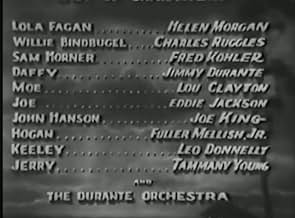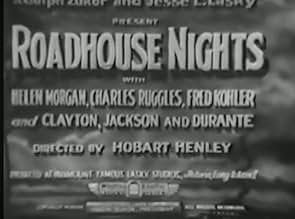Ajouter une intrigue dans votre langueA boozing newsman (Charles Ruggles) woos a singer (Helen Morgan) while spying on her bootlegger boyfriend (Fred Kohler).A boozing newsman (Charles Ruggles) woos a singer (Helen Morgan) while spying on her bootlegger boyfriend (Fred Kohler).A boozing newsman (Charles Ruggles) woos a singer (Helen Morgan) while spying on her bootlegger boyfriend (Fred Kohler).
- Réalisation
- Scénario
- Casting principal
- Récompenses
- 3 victoires au total
Jimmy Durante
- Daffy
- (as Durante)
Lou Clayton
- Joe
- (as Clayton)
Eddie Jackson
- Moe
- (as Jackson)
Harry C. Bradley
- Hotel Desk Clerk
- (non crédité)
Hal K. Dawson
- Newspaperman
- (non crédité)
Jimmy Granato
- Clarinet
- (non crédité)
- …
Irving Sherman
- Banjo
- (non crédité)
- …
Avis à la une
After I watched this film, I read the IMDB page for it. I was shocked to see that Helen Morgan was only 30 when she made the movie, as I thought she was about 50! This is likely because Morgan was an alcoholic and ultimately died when she was 41...a very sad loss.
In the film, the heavy drinker is Willie (Charlie Ruggles). He's a newspaper reporter who spends most of his time frequenting various speakeasies. Despite this, he's an honest guy and excellent reporter.
In this story, Willie meets up with an old sweetie, Lola (Morgan) and she's working in a place owned by a mobster, Sam Horner. Willie spends much of the movie trying to get Lola to leave this job as she doesn't realize just how evil Sam is. But she does know enough to be afraid of the man...and what he'll do if she skidaddles.
In addition to Morgan and Ruggles, Jimmy Durante appears in this, his first film. He's fun...as you'd expect for Durante...but the interesting story seems to be what I remember most from the movie. An interesting and tough film.
In the film, the heavy drinker is Willie (Charlie Ruggles). He's a newspaper reporter who spends most of his time frequenting various speakeasies. Despite this, he's an honest guy and excellent reporter.
In this story, Willie meets up with an old sweetie, Lola (Morgan) and she's working in a place owned by a mobster, Sam Horner. Willie spends much of the movie trying to get Lola to leave this job as she doesn't realize just how evil Sam is. But she does know enough to be afraid of the man...and what he'll do if she skidaddles.
In addition to Morgan and Ruggles, Jimmy Durante appears in this, his first film. He's fun...as you'd expect for Durante...but the interesting story seems to be what I remember most from the movie. An interesting and tough film.
Helen Morgan stars here as Lola, a roadhouse singer who gets involved with her boss Sam (Fred Kohler) who is a gangster. He's a bootlegger and possibly the murderer of a nosy reporter (Joe King). On the trail of the missing reporter is Willie (Charlie Ruggles), a reporter who was once Lola's childhood sweetie back home. Willie pretends to be a barfly while he gathers information. He and Lola team up.
Against this dramatic action, there is a comedy act. It's the famous Clayton, Jackson & Durante headed up by none other than Jimmy Durante.
When Lola and Willie try to escape, they are trailed by Sam. A flat tire ends the escape attempt. Willie pretends to be drunk again and makes a phone call to his city editor. While appearing to be drunk he actually uses his ring to tap a coded messages to the newspaper.
This early talkie is notable for several reasons. Star Helen Morgan sings "It Can't Go on Like This" twice in her follow up to the sensational APPLAUSE (1929). This is her last starring role in a film.
This film was written by Ben Hecht, based on a novel by Dashiell Hammett. And this is the only film appearance of Durante (his film debut) and his partners, a comedy team that starred in vaudeville. Durante would go solo soon after this film.
The film captures the seedy roadhouse atmosphere quite well.
Against this dramatic action, there is a comedy act. It's the famous Clayton, Jackson & Durante headed up by none other than Jimmy Durante.
When Lola and Willie try to escape, they are trailed by Sam. A flat tire ends the escape attempt. Willie pretends to be drunk again and makes a phone call to his city editor. While appearing to be drunk he actually uses his ring to tap a coded messages to the newspaper.
This early talkie is notable for several reasons. Star Helen Morgan sings "It Can't Go on Like This" twice in her follow up to the sensational APPLAUSE (1929). This is her last starring role in a film.
This film was written by Ben Hecht, based on a novel by Dashiell Hammett. And this is the only film appearance of Durante (his film debut) and his partners, a comedy team that starred in vaudeville. Durante would go solo soon after this film.
The film captures the seedy roadhouse atmosphere quite well.
Ever watched a film where when the credits rolled you still didn't fully understand what you'd just watched. You understood the story, you knew what was going on but you simply didn't "Get it". That was my problem here with Roadhouse Nights.
Based on Dashiell Hammett's book Red Harvest this story has been seen before in film form more famously as Yojimbo (1961), A Fistful of Dollars (1964) and Miller's Crossing (1990).
This version however is very different from what I've seen of the others and I don't mean that in a good way, not even remotely.
The plot is messy, the cinematography is bad even for the 1930's and it's outstandingly dull. It springs to life several times with musical numbers but that cannot save Roadhouse Nights from oceans of mediocrity.
One for fans of..............................I don't actually know.
The Good:
Musical moments are enjoyable enough
The Bad:
Utterly lifeless
Very poor editing
Things I Learnt From This Movie:
How can I learn anything if I don't know what in the blue hell is going on?
Based on Dashiell Hammett's book Red Harvest this story has been seen before in film form more famously as Yojimbo (1961), A Fistful of Dollars (1964) and Miller's Crossing (1990).
This version however is very different from what I've seen of the others and I don't mean that in a good way, not even remotely.
The plot is messy, the cinematography is bad even for the 1930's and it's outstandingly dull. It springs to life several times with musical numbers but that cannot save Roadhouse Nights from oceans of mediocrity.
One for fans of..............................I don't actually know.
The Good:
Musical moments are enjoyable enough
The Bad:
Utterly lifeless
Very poor editing
Things I Learnt From This Movie:
How can I learn anything if I don't know what in the blue hell is going on?
This movie was originally based on Dashiell Hammett's first book Red Harvest. However, multiple re-writes have led it to be nothing like the hard-boiled detective novel. I have read Red Harvest and thought I'd see how close this movie came. Aside from having bootleggers, coppers, and a female leading character, nothing is the same. I can't even be sure which movie character is supposed to represent which character in the book.
Even accounting for the movie's age, I did not find it that entertaining, although Jimmu Durante's first movie appearance was interesting and well done. For those under the age of 60, Jimmy Durante was a vaudeville and later movie comedian famous for his large nose.
Even accounting for the movie's age, I did not find it that entertaining, although Jimmu Durante's first movie appearance was interesting and well done. For those under the age of 60, Jimmy Durante was a vaudeville and later movie comedian famous for his large nose.
... in fact it was his first film role. After this film he got a contract with MGM and stayed there for a good long while. But that's another story.
This is a 1930 Paramount featuring Charlie Ruggles as a newspaper reporter (who spends a lot of time posing as a tippler) investigating a small nightclub run by a notorious bootlegger ready to bump off anyone threatening his operations.
Fred Kohler, he of the gruff "Oh, yehhh?" school of tough guy acting, plays the bootlegger boss who carries a gun and does much of his own dispatching, while singer Helen Morgan gets top billing as a singer (what else?) in Kohler's roadhouse who was sweeties once upon a time with Ruggles years before they took up their current occupations.
Morgan sings a song or two in this one, though, nothing, unfortunately, of great note. Her memorable warbling and performance in Show Boat were still six years away.
One of the film's most pleasant surprises is the presence of Jimmy Durante, only this time he's part of a three man act called Clayton, Jackson and Durante. Durante is clearly the star of the act and, for those who enjoy the Great Schnozzola, he scores well in this film. "It's the gallows, the gallows," he keeps saying, in reference to the cutthroats that run the rough roadhouse in which he and Morgan both work.
Durante vaudeville partner Lou Clayton would die in 1950 but Eddie Jackson would later appear with Durante on television in The Jimmy Durante Show in 1954. This is the only film made in which the three vaudeville partners can be seen together.
The film has a certain primitive power, though it is, at times, a crudely filmed early talkie. (The tops of heads of actors are frequently cut off in the camera shot). The legendary Ben Hecht is credited as scenarist, and the film does have some of the hard bitten style that you would associate with him.
This is a 1930 Paramount featuring Charlie Ruggles as a newspaper reporter (who spends a lot of time posing as a tippler) investigating a small nightclub run by a notorious bootlegger ready to bump off anyone threatening his operations.
Fred Kohler, he of the gruff "Oh, yehhh?" school of tough guy acting, plays the bootlegger boss who carries a gun and does much of his own dispatching, while singer Helen Morgan gets top billing as a singer (what else?) in Kohler's roadhouse who was sweeties once upon a time with Ruggles years before they took up their current occupations.
Morgan sings a song or two in this one, though, nothing, unfortunately, of great note. Her memorable warbling and performance in Show Boat were still six years away.
One of the film's most pleasant surprises is the presence of Jimmy Durante, only this time he's part of a three man act called Clayton, Jackson and Durante. Durante is clearly the star of the act and, for those who enjoy the Great Schnozzola, he scores well in this film. "It's the gallows, the gallows," he keeps saying, in reference to the cutthroats that run the rough roadhouse in which he and Morgan both work.
Durante vaudeville partner Lou Clayton would die in 1950 but Eddie Jackson would later appear with Durante on television in The Jimmy Durante Show in 1954. This is the only film made in which the three vaudeville partners can be seen together.
The film has a certain primitive power, though it is, at times, a crudely filmed early talkie. (The tops of heads of actors are frequently cut off in the camera shot). The legendary Ben Hecht is credited as scenarist, and the film does have some of the hard bitten style that you would associate with him.
Le saviez-vous
- AnecdotesJimmy Durante's film debut.
- ConnexionsFeatured in Broadway: The American Musical (2004)
Meilleurs choix
Connectez-vous pour évaluer et suivre la liste de favoris afin de recevoir des recommandations personnalisées
Détails
- Date de sortie
- Pays d’origine
- Langue
- Aussi connu sous le nom de
- The River Inn
- Lieux de tournage
- Paramount Studios, Astoria, Queens, New York City, New York, États-Unis(as Paramount Famous Lasky Studio)
- Société de production
- Voir plus de crédits d'entreprise sur IMDbPro
- Durée1 heure 8 minutes
- Couleur
- Rapport de forme
- 1.20 : 1
Contribuer à cette page
Suggérer une modification ou ajouter du contenu manquant

Lacune principale
By what name was Roadhouse Nights (1930) officially released in Canada in English?
Répondre





















